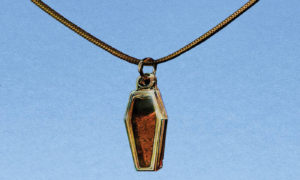 White Hinterland’s new album Baby, out this week on Dead Oceans, is a genre-transcendent feat of genius, fusing R&B, electronic pop, and piano balladry. At times, the record’s aural components are remarkably straightforward, while at others, the individual parts work together to serve as an avant-garde reimagining of pop music. However, even at its most simple, and certainly at its most complex, the album is daring, ambitious, and extraordinary.
White Hinterland’s new album Baby, out this week on Dead Oceans, is a genre-transcendent feat of genius, fusing R&B, electronic pop, and piano balladry. At times, the record’s aural components are remarkably straightforward, while at others, the individual parts work together to serve as an avant-garde reimagining of pop music. However, even at its most simple, and certainly at its most complex, the album is daring, ambitious, and extraordinary.
The creative force behind White Hinterland, Casey Dienel, began her career with a couple of quirky piano pop albums for small Portland label Hush Records alongside folk acts such as Norfolk & Western and The Decemberists (in their earliest days). Strangely, Baby contains moments that feel perfectly aligned with her origin and others that seem entirely alien. At the center of these songs remain two pillars: Dienel’s songwriting and her voice, the latter of which manages to impress without sounding like a polished, radio cliché. On the contrary, Dienel’s timbre is full of humanity—aching, raw, urgent.
A human voice, alone and almost unfettered by any mark of production, occupies the first minute of the album, which is bookended by the simplest songs of the collection. This introduction and track arrangement indicate the building blocks of the record, but in between these moments of clarity, Dienel challenges listeners with busy, post-modern vocal pop gems. Standouts include “Ring the Bell,” where layered loops of Dienel’s voice blend with synth sequences and electronic snares that swirl into a tangled frenzy, and title-track “Baby,” with dark tones and pained vocal delivery that simmers under a wash of affected keys before bursting into prominence at the song’s culmination.
Also of particular note are Dirty Projectors-esque track “White Noise” with its surprising melodies and yearning piano anthem “David,” which features cutting and nostalgic lyrical imagery. Even sprawling late-album tracks that veer dangerously closely to dragging on manage to offer incentives for listeners’ attention. “No Devotion” utilizes a driving electro-rock hook, and “Sickle No Sword” appeals to a sense of indulgent release as it borrows from iconic singer Nina Simone, which on its own earns points in my book. On “Metronome,” Dienel fully embraces the early 90s pop sensibilities she flirts with on the other tracks; thin snares and snappy delivery conjure images of bright pink lipstick and sassy, shoulder-centric dance moves. Not to mention, the song contains the line, “Show me some respect, baby, then I’ll let you ride with me.” Empowered Destiny’s Child fans everywhere should swoon.
Perhaps most important is the album’s understated intelligence—this is powerful, challenging song craft dressed up like a pop album. To describe it as merely entertaining and enjoyable, though it is, undermines Dienel’s progressiveness and audacity. Baby is not only a lens to examine the female pop musicians on which Dienel’s generation was raised but also a looking glass into the future of independent and popular music.










